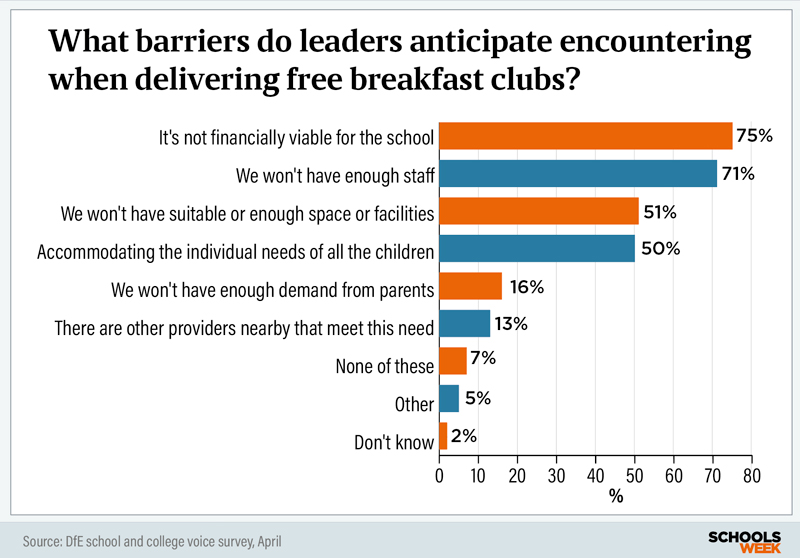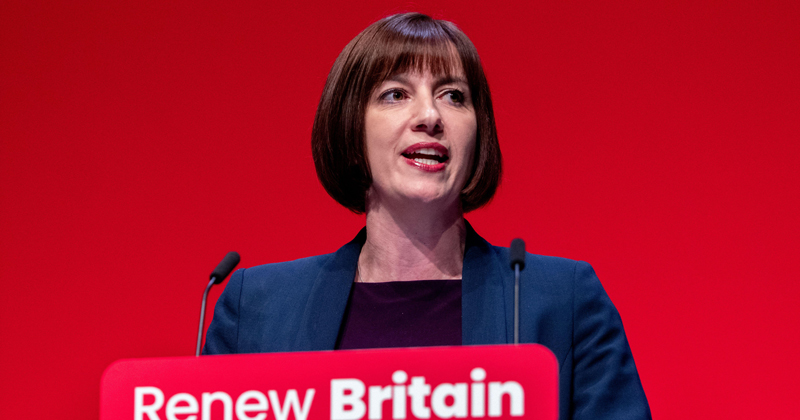A government survey has revealed three-quarters of primary leaders fear breakfast clubs are “not financially viable in their school” – just as it announced 2,000 more will be launched from April.
The scheme is being piloted in 750 “early adopters”, although there have been issues over funding and logistics.
On Saturday, Bridget Phillipson, the education secretary, announced a further £80 million to set up more clubs.
She said this national roll-out in 2,000 primaries would start in April, with schools also joining next September.
Labour’s manifesto promised free breakfast clubs in all 17,000 primary schools, with £315 million committed to the scheme by 2028.
The Department for Education said details of the full rollout and how schools could apply “will be released later in the year”.
The government previously said more than 3,000 schools had expressed an interest in becoming early adopters.
Widespread cost concerns
But findings from the DfE’s April “school and college voice” survey, released this week, show widespread concerns.
Of the 770 primary leaders surveyed, 75 per cent said delivering a free breakfast club was “not financially viable for [their] school”. Seventy-one per cent said “we won’t have enough staff”.
Meanwhile, just over half said they “won’t have suitable or enough space or facilities”.
The heads polled were from a broad sample of schools, many of which have paid-for breakfast schemes, and some of which had no breakfast scheme.

Of the 675 leaders whose schools already offered some form of breakfast provision, 44 per cent said recruiting enough suitable staff was a challenge, while 35 per cent cited existing workloads as an issue.
This week the DfE also released an assessment of the first year of the national scheme by Susan Acland-Hood, its permanent secretary.
She acknowledged a “principal risk” that schools “are unable to deliver” the clubs “either due to space, staffing or transport constraints”. Take-up could also be “significantly higher or lower” than departmental modelling.
“We are mitigating these risks by using insight gathered during the early adopter phase.”
“The programme is supported by a comprehensive delivery plan, evaluation strategy, and stakeholder engagement framework, and builds on a successful early adopter test and learn scheme.”
Acland-Hood said she was “satisfied” the programme “represents good value for money…and is feasible to deliver in 2026 to 2027”.
‘Historic change for working families’
Phillipson hailed the national rollout as “an historic change in working families’ daily routines” and “another example of this Labour government making good on its promises to deliver the change the British people voted for”.
Phillipson told Labour’s conference this week that the scheme had so far provided 2.5 million breakfasts.
Paul Whiteman, of the NAHT school leaders’ union, welcomed “the principle of free breakfast clubs”.
“A good breakfast helps children to concentrate on their learning and has enormous benefits for their health and wellbeing.”
But he warned it was “really important that feedback from the government’s initial trial is taken into account as part of this roll-out, including concerns over funding, staffing and space within school buildings”.
A DfE spokesperson said: “The survey does not reflect the viability of the free breakfast club scheme as the vast majority of respondents were not from schools taking part.”
They said the 750 early adopter schools are “successfully delivering over 2.6 million meals with the current funding”.
“The Education Secretary has always been clear this is a test and learn period to ensure the best possible outcomes – we have increased the funding to £80million for the next phase and will continue working closely with the sector to deliver an impactful and successful national rollout.”















All KS3 students get free breakfast in my school. We have about 900 KS3 students, and they get a choice of toast or cereals every morning. During Mock and exam weeks, KS4 students get free breakfast too.
This happens during tutor time, meaning there are plenty of staff to supervise.
My school is in a disadvantaged area, and ensuring every student gets an opportunity to have breakfast ensures that they are all better ready to start the day.
Great Idea but in this real world do teachers want to start early to provide breakfast clubs for youngsters and after school clubs they say there is staff shortages less staff even staff doing lunch time supervision it’s a long day for children and s
Has anyone considered that the existing “private” wraparound care businesses that have been providing breakfast and after school clubs for many years may cease to exist.
They’ve already had to cope with COVID, home working, and a lack of trained staff, who is then going to fill the hole for parents who need to set off to work before 8am and don’t get back till after 5